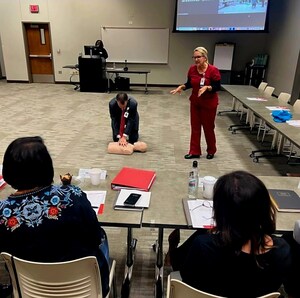Study Highlights:
-- Death rates after hospitalization for heart failure have declined in recent years for the most elderly patients, while rehospitalizations remain frequent.
-- As the U.S. population ages, a better understanding of heart failure in the oldest patients is needed.
DALLAS, April 5, 2011 /PRNewswire-USNewswire/ -- Death rates after hospitalization for heart failure have dropped for veterans age 80 and older, but rehospitalizations remain frequent, according to a study in the American Heart Association journal Circulation: Heart Failure.
(Logo: http://photos.prnewswire.com/prnh/20100222/AHSALOGO)
Results of the study highlight a need to better identify which patients among the oldest are more likely to be rehospitalized not just for heart failure, but for any reason, said Rashmee Shah, M.D., lead author of the study and postdoctoral fellow in the Department of Health Research and Policy at Stanford University School of Medicine in Palo Alto, Calif.
Using Department of Veterans Affairs data, researchers identified 21,397 U.S. veterans age 80 or older who were hospitalized at least once for heart failure from 1999 through 2008. They then compared the heart failure patients' outcomes in different age groups — 80 to 84, 85 to 89, and 90 or older — and found that death rates within 30 days of the first recorded hospitalization for heart failure were cut in half from 14 percent to 7 percent, and death rates within a year fell from 48.8 percent to 27.2 percent.
Heart failure patients 90 and older were the most likely to die within a year of the initial hospital admission, researchers said. But 30-day and one-year death rates improved the most in that group — 11 percent and 26 percent improvements in 30-day and one-year mortality, respectively. With relatively few heart failure patients of that age — about 8 percent of the total — it's hard to draw conclusions about the trend, Shah said.
Overall, the drop in death rates might be due to the growing emphasis in recent years on performance measures that promote evidence-based treatment of heart failure.
"There was a lot of room for improvement since so many patients in the oldest age groups were not getting evidence-based heart failure therapies, historically," Shah said.
Though the average age at diagnosis is older than 75, elderly heart failure patients typically are defined as those who are only 65 or older. "Our definition of elderly heart failure patients needs to change," Shah said. "As the population ages, doctors will be treating more heart failure patients in their 80s or older."
In recent years, studies have indicated heart failure that develops late in life often differs from heart failure in younger patients. In most younger patients, the heart typically can't pump well, a condition called heart failure with decreased ejection fraction. In contrast, older patients often have preserved ejection fraction, where the heart seems to be pumping a normal amount of the blood that enters it, but the heart muscle is stiff and isn't relaxing enough to collect blood properly.
The hospital readmission rate for any cause within 30 days of the initial heart failure hospitalization was 17.3 percent, and remained largely unchanged between 1999 and 2008.
Various steps could potentially reduce the risk of short-term readmissions among very elderly heart failure patients, including better patient education, blood testing or other follow-up by a physician shortly after hospital discharge, Shah said.
"The next step would be another investigation to see what's driving the readmissions and test interventions to reduce readmissions among this growing population," Shah said.
The ranks of the oldest Americans are expected to grow dramatically over the next 40 years. The U.S. Census Bureau projects that nearly 21 million Americans will be 85 or older in 2050 — about 5 percent of the population, compared with about 2 percent today.
Since the current research involved only veterans, the findings don't necessarily apply to broader populations, Shah said. Women, who typically develop heart failure later in life than do men, constituted only 2.6 percent of the study population. Also, the Department of Veterans Affairs uses electronic health records and integrates all levels of care, including inpatient, outpatient and pharmacy services, so doctors can more easily monitor patients after hospitalization. "When the different aspects of health care provision are integrated, that may help in managing complex diseases, like heart failure," Shah said.
The researchers also couldn't analyze their results according to patients' race and ethnicity because the information was unavailable for many of the patients.
Co-authors are Vivian Tsai, M.D.; Liviu Klein, M.D., M.S.; and Paul A. Heidenreich, M.D., M.S. Author disclosures and sources of funding are on the manuscript.
The Veteran's Affairs Health Services Research Development Office funded the study.
Statements and conclusions of study authors published in American Heart Association scientific journals are solely those of the study authors and do not necessarily reflect the association's policy or position. The association makes no representation or guarantee as to their accuracy or reliability. The association receives funding primarily from individuals; foundations and corporations (including pharmaceutical, device manufacturers and other companies) also make donations and fund specific association programs and events. The association has strict policies to prevent these relationships from influencing the science content. Revenues from pharmaceutical and device corporations are available at www.americanheart.org/corporatefunding.
NR11 – 1058 (Circ HF/Shah)
Additional resources:
- The American Heart Association has online information and tools to help you get the facts about heart failure at www.heart.org/heartfailure.
- Downloadable stock footage, animation and our image gallery are located at www.heart.org/news under Multimedia.
CONTACT:
Karen Astle (214) 706-1392; [email protected]
Bridgette McNeill: (214) 706-1135; [email protected]
Julie Del Barto (broadcast): (214) 706-1330; [email protected]
SOURCE American Heart Association
WANT YOUR COMPANY'S NEWS FEATURED ON PRNEWSWIRE.COM?
Newsrooms &
Influencers
Digital Media
Outlets
Journalists
Opted In






Share this article